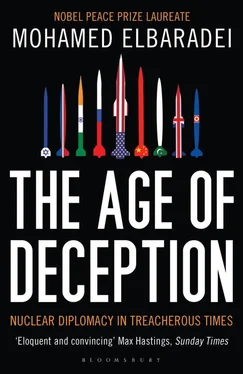Bush surprised me again. “It’s not only the best solution,” he replied, “it’s the only solution—other than the Israeli solution. You know there is concern,” he added, “that the Israelis might want to use force.”
I waited to hear what he might share about the specifics of the Israeli threat, but he was rather vague and did not seem to know whether or when Israel might launch a military strike, or at least he did not tell me. He implied that the U.S. approach of maximizing pressure on Iran was intended to avoid such an action by Israel. I was reminded of a conversation I’d had with Jack Straw and German foreign minister Joschka Fischer in which they said that the EU-3 was trying to act as a kind of “human shield,” through their dialogue with Iran, to protect against the risk of military action by the United States or Israel.
At that time there was considerable disagreement within the U.S. government: the hawks seemed to be advocating a military strike and regime change in Tehran, despite the lessons of the Iraq War. They saw Iran as an existential threat to Israel and opposed any dialogue with Iran that might “legitimize” the regime in Tehran. Others—including, from what I could tell, President Bush and Condoleezza Rice, despite their public rhetoric—believed that diplomacy was the preferred pathway but that a set of preconditions must be met in advance of negotiations. Still others, such as Powell and Armitage, favored negotiation and dialogue without preconditions as the route to a diplomatic solution.
I had brought with me a written message from Hassan Rowhani, on behalf of the Iranian regime, saying that Iran was ready to enter into dialogue with the United States on all issues, including both Iran’s nuclear program and broader matters of regional security. The message was on a single sheet of paper, without a letterhead or signature, as it had been delivered to me. I handed the note to Bush, explaining its origin, and told him how important I felt it was for the United States to initiate a dialogue with Iran.
“I’d like to talk leader to leader,” Bush responded, “but I’m not sure that Iran’s leader is ready to engage.” He was referring to Ayatollah Khamenei, Iran’s Supreme Leader. “I think he is bent on the destruction of Israel.”
He raised other issues, including some forty Al-Qaeda operatives of Saudi Arabian or Egyptian origin being held by Iran, individuals in whom the United States had an interest. According to Bush, the Iranians were keeping these detainees as a negotiating card.
I felt that Bush was, in his way, confirming my view that a U.S.-Iran dialogue could bring multiple and mutual benefits, not least of which was the security assistance Iran could provide in Iraq, because of its ties to the Shi’ite population there. Dialogue, I said, was a sign of respect, and respect—particularly in a Middle Eastern cultural milieu—was a first step toward a peaceful resolution of tensions. Many members of Iran’s political establishment wanted above all else to reestablish ties to the United States, preferably as part of a “grand bargain” that would address security, trade, Israel’s perception of an Iranian military threat, and other issues relevant to full normalization of relations. This was the gist of Rowhani’s note. But neither Bush nor Rice seemed, at that time, open to such a prospect.
Toward the end of the meeting, I suggested convening an international summit to discuss how to strengthen the nonproliferation regime. Rice brightened: “I always thought that we needed to have such a summit,” she said. The United States was clearly looking for some way to show leadership, particularly in an election year in which weapons of mass destruction and terrorism figured so prominently. [15] Unfortunately, the concept of an international summit went no further. I was told that John Bolton had opposed the idea and found a way to keep it from happening.
I was encouraged. My meeting with Bush had turned out to be far more substantive than I had expected. Further encouragement came during my next meeting, in Langley, Virginia, with George Tenet, director of the CIA, a professional who gave us straight talk. I sensed a level of caution, an avoidance of overstatement, which differed markedly from the intelligence claims we had heard in the run-up to the Iraq War.
Tenet himself was convinced that Iran’s nuclear program was intended to develop nuclear weapons but acknowledged that he had no concrete proof, no “actionable information,” in the intelligence vernacular. He was essentially hoping the Iranians would trip up somewhere during the inspection process.
Tenet’s view gave me some insight into the American political rhetoric and media campaign, which kept repeating that the United States “knew” Iran had a nuclear weapons program but presented no concrete evidence. From what I could tell, the CIA, through wiretapping and other surveillance, probably had indications that Iran’s Revolutionary Guard had been involved in procurement and other aspects of the nuclear program, yet nothing revealed a link to weapons development. The only U.S. strategy, therefore, was to put pressure on Iran, through the IAEA and the press, in hopes that damning evidence would come to light or that an informant would come forward with a “smoking gun.”
Iran was not helping its case. The obfuscation over its work on P-2 centrifuge technology and Tehran’s abrupt cancellation of inspections at Natanz and other facilities had heightened the Agency’s sense of unease. A stern message was in order, which I decided to deliver in person, with a visit to Tehran.
In each of my meetings during that trip—with leaders ranging from President Khatami to Foreign Minister Kamal Kharazi—I said I was sick and tired of their procrastination and delays. With President Khatami I was deliberately cold, since he had deceived me during our previous discussion. I did not confront him about this directly but made it clear from my behavior that my attitude toward him had changed. I let him and others know that the IAEA Board’s patience was wearing thin; Iran was losing support among some Member States and the overall issue was becoming divisive. Anything short of full and consistent transparency on the part of the Iranians would only work against them. I conveyed to Rowhani and Khatami the key elements of my conversation with President Bush: that he was skeptical of the Iranians’ readiness for serious dialogue; that the United States urgently wanted the Al-Qaeda detainees repatriated to their respective countries. I mentioned that the Americans had been put off by Iran’s initial refusal to accept U.S. aid after the earthquake.
Khatami was indignant about the U.S. skepticism. He pointed to the rapprochement between the countries during the Clinton administration, when Khatami had made the first move by apologizing to the families of the former American hostages in Tehran. Madeleine Albright had responded by acknowledging the CIA’s role in the 1953 coup that had overthrown Prime Minister Mohammad Mossadegh and reinstated the shah and by lifting the import prohibitions on certain Iranian luxury items, such as pistachios, caviar, and carpets, a symbolic gesture worth millions of dollars.
It was the Bush administration, Khatami insisted, that had undermined progress in U.S.-Iran relations. Iran had supported the Americans during the war in Afghanistan and in their preparations for the war in Iraq. Khatami mentioned specific meetings in Sulaymaniyah, in Iraqi Kurdistan, and in London in which Iran participated. “In return for our assistance and cooperation,” Khatami fumed, “the only thing we got was to be branded as part of an ‘axis of evil.’”
Foreign Minister Kharazi was equally indignant about the U.S. offer after the earthquake. “After decades of damaging boycotts and sanctions,” he remarked, “the United States wants to insult us by offering ten million dollars as charity?” He shook his head. “These people do not understand the mentality of others.” The Iranian government would be happy to discuss the Al-Qaeda detainees, Kharazi said, but he wanted corresponding help from the United States in dealing with the Mujahedin-e Khalq, the militant group of Iranian dissidents that advocated the overthrow of Iran’s government.
Читать дальше












